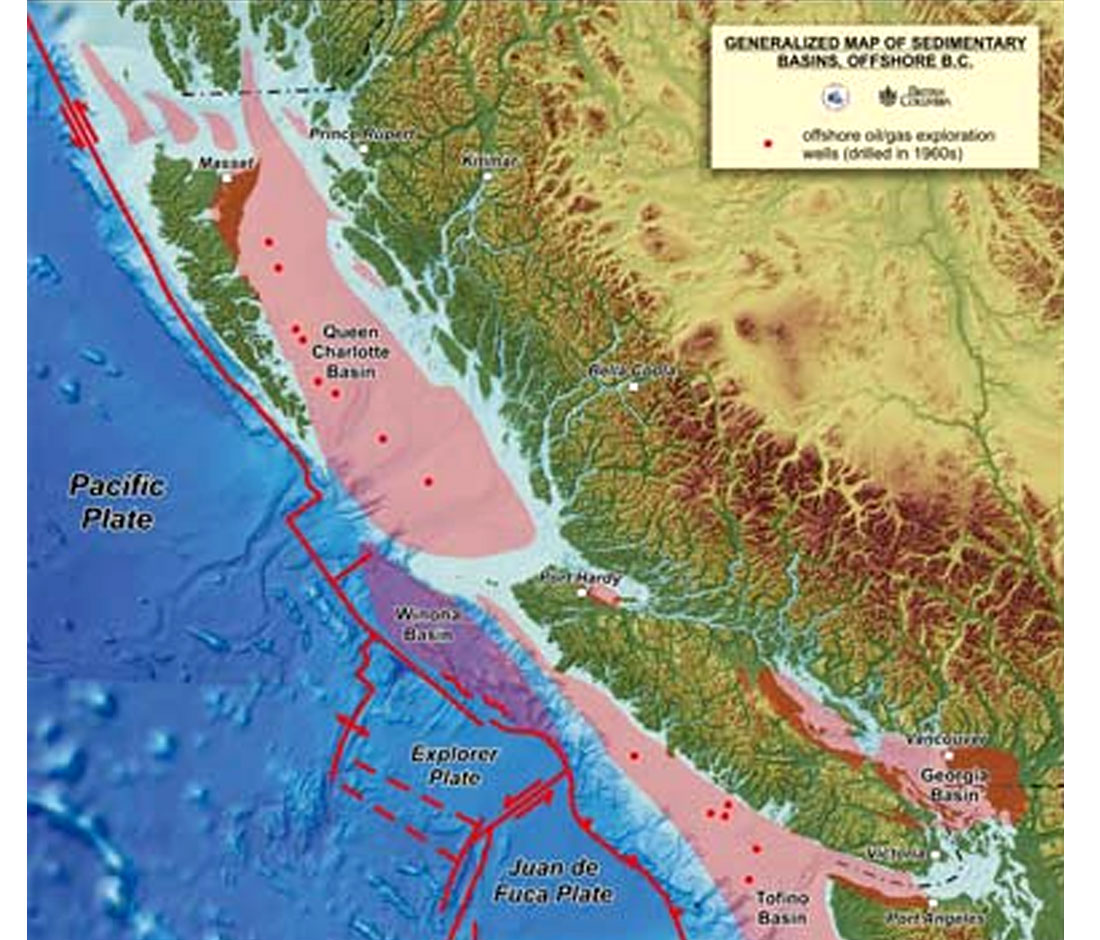British Columbia remains committed to the responsible development of the Province’s offshore oil and gas resources. The Geological Survey of Canada estimates the Queen Charlotte Basin (the largest and most commercially prospective of four basins off the west coast of British Columbia) could contain 25.9 trillion cubic feet of natural gas and 9.8 billion barrels of oil.
In 2004, a Royal Society of Canada Expert Panel in a Report on Science Issues Related to Oil and Gas Activities Offshore British Columbia estimated the value of the oil and gas resources in the Queen Charlotte Basin at $110 billion. This report was commissioned by Natural Resources Canada. The economic benefits for First Nations, coastal communities and British Columbians in general from offshore oil and gas development could be significant.
Several scientific and technical reports commissioned by both the B.C. and the Federal Governments have been completed. These include an Offshore Oil and Gas Technology Report (October 2001), an independent three-member British Columbia Scientific Review Panel Report (January 2002). The Federal Government and the Royal Society Report in 2004, the Priddle Review of the Federal Moratorium on Oil and Gas Activity in Offshore British Columbia Report, and the Brooks Report “A First Nations Perspective on the Lifting of the Federal Moratorium on Offshore Oil & Gas Exploration in the Queen Charlotte Basin of British Columbia”. Although the reports identified science gaps that must be addressed prior to activity taking place, no scientific or technical barriers were found that warrant a blanket moratorium over west coast offshore oil and gas development activities. In addition, B.C. provided a $2 million grant to the University of Northern British Columbia to complete a number of reports that review and document the state of knowledge about the environment and the socio-economic conditions in the area of the Queen Charlotte Basin.

The Province is undertaking a number of initiatives intended to enable offshore oil and gas development to occur in British Columbia. The Ministry of Energy, Mines and Petroleum resources is researching management and regulatory regimes in other jurisdictions in order to determine what could be most appropriate for west coast offshore development. The Offshore Oil and Gas Branch within the Ministry is working to identify potential risks and benefits of offshore development, to develop a comprehensive fiscal and regulatory regime, and to advance scientific knowledge of offshore oil and gas development.
The Province is investing in research and partnering with the University of Victoria (UVic) to address a number of the research gaps identified in the science reviews. Economists at UVic with colleagues at Memorial University of Newfoundland are completing an economic evaluation of a number of oil and gas scenarios that are based on the size of the expected oil and gas pools in the Queen Charlotte Basin. The report will discuss the economic viability of the expected economic rents that accrue to governments under various scenarios.
A Protocol Agreement signed with the Nisga’a Nation in 2005 has government working collaboratively on offshore issues, including a project to collect and disseminate information to their membership on the risks and benefits of offshore oil and gas development.
Several First Nations and coastal community leaders have participated in fact-finding missions to offshore oil and gas production facilities in Cook Inlet, Alaska as well as the Gulf of Mexico. Plans are underway to bring coastal community and First Nations leaders together to work on a number of matters related to offshore development, including regulatory frameworks, benefits, risks and opportunities. The Ministry actively participates in a number of federal and provincial ocean planning initiatives, including a newly launched planning process called the Pacific North Coast Integrated Management Area (PNCIMA), to ensure offshore oil and gas development opportunities are accounted for in marine management decision-making. The PNCIMA process will involve Federal, Provincial and First Nations governments working with stakeholders. PNCIMA involves a large geographic area that covers ~60% of the BC Coast and all of the prospective Queen Charlotte Basin.
In December 2006, the Premier publicly reaffirmed the importance of British Columbia’s offshore oil and gas as a future source of energy and economic growth. In the newly released BC Energy Plan (February 2007) the Province re-affirmed its commitment to offshore oil and gas exploration and development, its request to Canada to lift the federal moratorium and reiterated that the provincial moratorium will be lifted at the same time (see: http://www.energyplan.gov.bc.ca).











Join the Conversation
Interested in starting, or contributing to a conversation about an article or issue of the RECORDER? Join our CSEG LinkedIn Group.
Share This Article